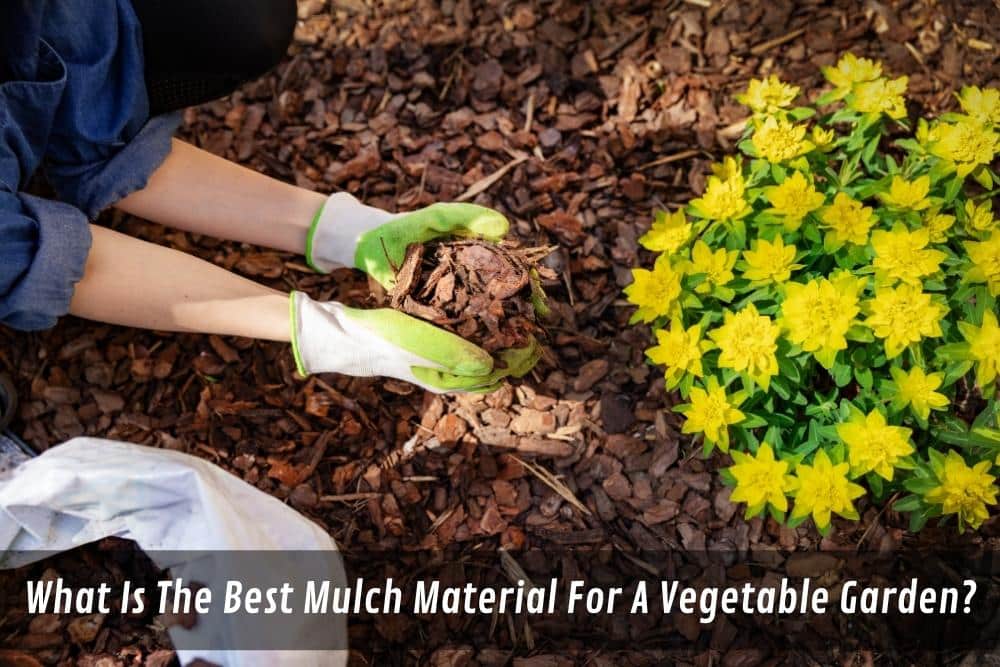If you’re looking for ways to improve the health and yield of your vegetable garden, using the best mulch material could be the answer. Mulching is an important part of maintaining a thriving garden, as it can help retain moisture, regulate soil temperature, and suppress weed growth. However, with so many options available, it can be overwhelming to choose the best mulch material for your vegetable garden. In this blog, we’ll explore some of the most popular mulch materials and their pros and cons, so you can make an informed decision and get the most out of your garden.
What are the different types of mulch material?
There are several types of mulch material to choose from when looking to mulch your vegetable garden.
- Organic mulches are a popular choice, and they come in many forms, including grass clippings, shredded leaves, pine needles, and wood chips. Organic mulches are great for controlling weeds, preventing moisture loss, and adding organic matter to the soil as they break down.
- Garden soil can also be used as mulch for the vegetable garden, especially in early spring when the soil is still cold. It helps to retain moisture and warm up the soil, promoting healthy plant roots.
- Black plastic and landscaping fabric are other types of mulch that can be used to prevent weeds and retain moisture in the soil. However, they are not organic and do not add any nutrients to the soil.
- Coloured mulch and rubber mulch are popular choices for landscaping projects, but may not be the best choice for vegetable gardens as they do not add any organic matter to the soil.
What are the advantages and disadvantages of using mulch in the garden?
Mulch can provide several advantages for a garden, including:
-
Moisture retention
Mulch helps to retain moisture in the soil, reducing the need for frequent watering.
-
Temperature regulation
It can help regulate the temperature of the soil, keeping it cool in the summer and warm in the winter.
-
Weed suppression
It helps to suppress weed growth by blocking sunlight from reaching weed seeds.
-
Soil improvement
Organic mulches can add nutrients to the soil as they break down, improving soil health.
-
Erosion prevention
It can help prevent soil erosion by protecting the soil from wind and water.
However, there are also some potential disadvantages to using mulch in the garden:
-
Over-mulching
Too much mulch can lead to waterlogged soil, which can harm plants and promote fungal growth.
-
Pest attraction
Some types of mulch can attract pests, such as slugs or termites, to the garden.
-
Soil acidity
Certain types of mulch, such as pine needles or oak leaves, can make the soil more acidic over time.
-
Nutrient depletion
Some types of mulch, such as wood chips, may temporarily deplete nitrogen from the soil as they break down.
-
Cost
Depending on the type of mulch and the size of the garden, using mulch can be costly.
Overall, the advantages of using mulch in the garden usually outweigh the disadvantages. As long as proper care and maintenance are taken to ensure that the mulch is applied correctly and in moderation.
What type of mulch would you recommend for a vegetable garden?
You’ll need to consider factors like climate, soil, and plants when deciding which type of mulch is best for your vegetable garden. However, in general, organic mulches are a great choice for vegetable gardens. They can provide several benefits, such as weed suppression, moisture retention, and soil improvement.
Some of the best organic mulches for vegetable gardens include:
-
Shredded leaves
These can be collected in the fall and used as mulch in the spring. They provide good weed suppression and help to improve the soil structure as they break down.
-
Grass clippings
You can apply these in a thin layer to the soil to provide plants with nitrogen-rich nutrients.
-
Straw
Straw is a popular mulch material. It can be used to retain moisture, suppress weeds, and add organic matter to the soil.
-
Compost
Compost can be used as a mulch or added directly to the soil to provide nutrients and improve soil health.
-
Wood chips
You can use these as long-lasting mulch to help retain moisture and improve soil structure.
In addition to these options, you could also consider using a combination of different mulches. Such as mixing straw and shredded leaves or using grass clippings as a nutrient-rich top layer over a base of wood chips. Ultimately, the best type of mulch for your vegetable garden will depend on your specific needs and preferences.
How much mulch should you use, and when should you apply it?
The amount of mulch you should use in your vegetable garden will depend on the type of mulch you’re using and the specific needs of your garden. Generally, you should apply most mulches in a 2–4 inch thick layer. For lighter mulches like straw or grass clippings, use a thinner layer. Heavier materials like wood chips often need a deeper layer for proper coverage and effectiveness.
When it comes to timing, the best time to apply mulch to your vegetable garden will depend on the weather and the specific needs of your plants. Applying mulch in early spring is a good idea. Once the soil has warmed u,p but before it gets too hot. This will help to retain moisture and keep the soil cool during the hot summer months. If you’re using winter mulch, such as straw or leaves, you should apply it in the fall, after the growing season has ended.
It’s important to note that too much mulch can be harmful to your plants, so be careful not to over-mulch. A layer that is too thick can prevent water from reaching the roots of your plants. It can lead to root rot and other problems. Additionally, some types of mulch, such as grass clippings or fresh manure, can harm your plants if applied in too thick a layer. Be sure to follow the recommended guidelines for your chosen mulch and adjust the amount as needed based on the needs of your garden.
In conclusion, selecting the best type of mulch for your vegetable garden can be a bit overwhelming, given the variety of options available. However, by considering factors such as your climate, soil type, and plant needs, you can narrow down your choices and choose a mulch that will provide the most benefits for your garden. Organic mulches, such as shredded leaves, grass clippings, and straw, are great options. They provide numerous benefits, including weed suppression, moisture retention, and soil improvement. Additionally, wood chips and compost can also be used to enhance soil quality and nutrient content. Ultimately, the best type of mulch for landscaping and vegetable gardens depends on your unique needs. It’s important to choose a mulch that will provide the most benefits for your specific garden. You can ensure your vegetable garden thrives and yields a plentiful harvest with the correct type of mulch.
Contact A1 Gardening & Landscaping Sydney today to find out how we can help you create a beautiful and productive vegetable garden. We provide tree mulching services to help you achieve the garden of your dreams.

